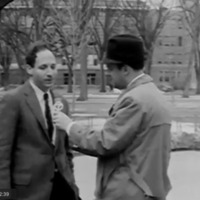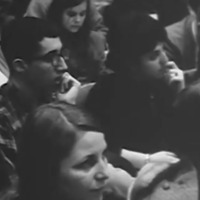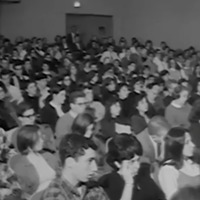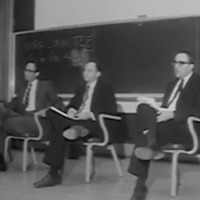Speaking Out Against the Vietnam War
As the Cold War escalated with events such as the Cuban Missile Crisis in October 1962, the thought of nuclear war became a reality. Bob Ross, a member of the VOICE chapter of SDS, who participated in the writing of the Port Huron Statement, declared that "the missile crisis made us all aware of the imminent threat of nuclear war." After the assassination of President John F. Kennedy in 1963, the tension in the United States heightened. Lyndon B. Johnson’s, also known as LBJ, succession as President led to the Gulf of Tonkin Resolution in August of 1964. This displayed Johnson's newfound ability to use conventional forces in Southeast Asia without Congressional approval. Therefore, conflict in Vietnam could be easily escalated, which brought attention to Vietnam at home for an a growing number of Americans. To put this into perspective, there were 23,310 military personnel stationed in Vietnam at the end of 1964 compared to 184,314 military personnel by the end of 1965. In Paul Potter’s speech, “Naming the System”, he identifies the heightened concern Americans felt regarding the government’s effort to continuously designate the United States as a savior against dictatorial powers in other nations, “the incredible war in Vietnam has provided the razor, the terrifying sharp cutting edge that has finally severed the last vestige of illusion that morality and democracy are the guiding principles of American foreign policy.”
In 1965, the concept of a teach-in started at the University of Michigan, and quickly gained traction. It spread to other universities throughout the United States because the majority of students did not know much about the political and economic reasons for American intervention in Southeast Asia. As a result, intellectuals felt the need to educate their students on American foreign policy. The teach-in, thus, can be seen as an under-informed populace with a desire to correct their lack of knowledge; and a heart-felt attempt to conceptualize and advance meaningful changes to American foreign policy. Although this was not the first time that students became activists, the teach-ins introduced a new standard for student activism.
Citations for this page (individual document citations are at the full document links).
Interview of Bob Ross, Page 11. Folder: Ross, Bob. [42]. Contemporary History Project (The New Left in Ann Arbor). Box 1; 239-J. Bentley Historical Library
Grand Expectations. “Escalation in Vietnam.” Patterson
“Naming the System.” Paul Potter. http://mrzine.monthlyreview.org/2006/potter150106.html




